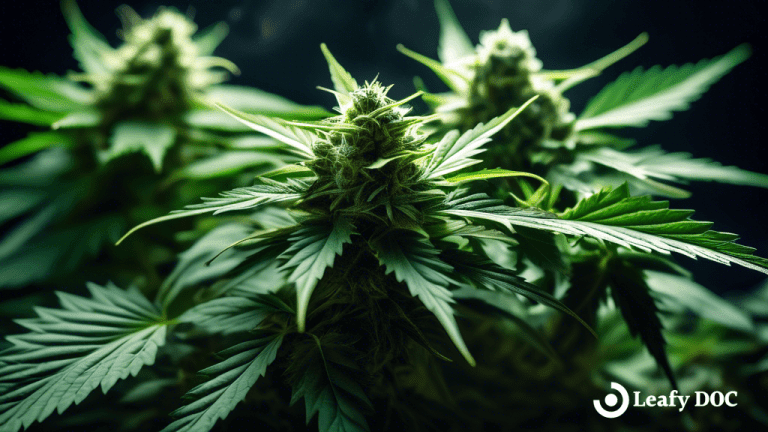Exploring The Benefits Of Medical Marijuana For Patients’ Access
by Tayyaba Amir · June 3, 2024
Unlock the power of medical marijuana to improve patients’ access and transform healthcare. Explore the surprising benefits of medical marijuana now! Click here for a game-changing perspective on healthcare.

Do you ever wonder about the potential benefits of medical marijuana for patients in need? From understanding its history to uncovering the science behind it, we will take you on an enlightening adventure that will leave you with a deeper understanding and appreciation for this remarkable plant. Step back in time and witness the fascinating history of medical marijuana, tracing its roots to ancient civilizations that revered its healing properties.
As we unravel the science behind this natural remedy, you’ll discover the intricate mechanisms at play within the human body, allowing medical marijuana to provide relief for a wide range of conditions and symptoms. From chronic pain to anxiety, epilepsy to multiple sclerosis, the potential benefits of medical marijuana are vast and awe-inspiring.
But accessing medical marijuana is not as simple as it may seem. Laws and regulations play a vital role in determining who can benefit from this plant and how they can obtain it. By exploring the legal landscape surrounding medical marijuana, we will shed light on the challenges patients face in gaining access to this therapeutic resource.
Join us on this captivating journey as we navigate through the potential benefits and risks of medical marijuana, empowering patients with the knowledge they need to make informed decisions about their healthcare.
Key Takeaways
- Medical marijuana has a long history of use in ancient civilizations for treating various ailments.
- It can effectively treat chronic pain, epilepsy, and multiple sclerosis, providing relief and improving symptoms.
- Access to medical marijuana can be challenging due to laws and regulations, making it important for patients to navigate the system with the help of medical professionals.
- While medical marijuana shows promise as a natural and effective treatment option, more research is needed to understand its long-term effects on physical and mental health.
Understanding the History of Medical Marijuana
You may not realize it, but the history of medical marijuana goes back thousands of years, with evidence of its use dating back to ancient civilizations such as Egypt and China. These ancient cultures recognized the therapeutic properties of marijuana and used it to treat a variety of ailments.
In Egypt, for example, cannabis was used as a remedy for pain relief and inflammation. The Chinese also used it as a medicinal herb, believing that it could balance the body’s energy and promote overall well-being.
Throughout history, medical marijuana has been utilized in various forms across different cultures. Its benefits were widely recognized, and it was used to alleviate symptoms of conditions such as epilepsy, glaucoma, and even mental health disorders. However, as time went on, the perception of marijuana shifted, and it began to be stigmatized and associated with criminal activities.
But now, as society is becoming more open-minded and aware of the potential benefits of medical marijuana, the tide is turning. People are starting to realize that this natural plant has the power to provide relief and improve the quality of life for those suffering from chronic pain, debilitating diseases, and other medical conditions. The subconscious desire for freedom and autonomy is driving individuals to seek alternative treatments and explore the potential of medical marijuana.
By advocating for patients’ access to medical marijuana, we can provide relief and improve the lives of countless individuals who are in desperate need of an alternative treatment option.
The Science Behind Medical Marijuana
Understanding the science behind how medical marijuana works can provide a sense of hope and possibility for those seeking alternative treatments. It’s fascinating to explore the intricate mechanisms by which this plant interacts with our bodies, offering potential relief and healing.
Here are a few key points to consider:
- Endocannabinoid System: Our bodies have a complex network of receptors, known as the endocannabinoid system, which plays an important role in regulating various physiological processes. Medical marijuana contains compounds called cannabinoids, such as THC and CBD, which can interact with these receptors and influence the body’s response to pain, inflammation, and other symptoms.
- Neuroprotective Effects: Research suggests that medical marijuana may have neuroprotective properties, meaning it can help protect and support the health of our nervous system. This is particularly relevant for conditions like multiple sclerosis and epilepsy, where the nervous system is affected.
- Customized Treatment: One of the advantages of medical marijuana is its versatility. Different strains and formulations can be tailored to target specific symptoms or conditions. This personalized approach allows patients to find the most effective treatment for their unique needs, offering a sense of empowerment and freedom in managing their health.
By understanding the science behind medical marijuana, you can gain a deeper appreciation for its potential as a natural and holistic treatment option. This knowledge allows you to make informed decisions about your health and explore the possibilities that medical marijuana can offer in your journey towards well-being.
Conditions and Symptoms that Can Be Treated with Medical Marijuana
Imagine finding relief from your chronic pain or debilitating symptoms through the use of a natural and alternative treatment option. Medical marijuana has been shown to be an effective treatment for a wide range of conditions and symptoms.
Whether you suffer from arthritis, multiple sclerosis, or even epilepsy, medical marijuana can provide the relief you’ve been searching for. Not only does medical marijuana offer a natural and less invasive approach to treatment, but it also gives you the freedom to take control of your own health.
Instead of relying on prescription medications with potential side effects and limited effectiveness, medical marijuana allows you to explore a more holistic and personalized approach. With medical marijuana, you have the power to choose what works best for you and your body, granting you the freedom to live your life to the fullest.
Accessing Medical Marijuana: Laws and Regulations
Accessing medical marijuana can be a complex process due to the various laws and regulations in place. However, the freedom to explore alternative treatments for your medical conditions is worth the effort. By understanding the laws and regulations surrounding medical marijuana, you can navigate the system and gain access to the relief you deserve.
To help you better understand the laws and regulations, let’s take a look at a table outlining the key points:
| State | Medical Marijuana Legalization | Conditions Allowed |
|---|---|---|
| California | Yes | Cancer, AIDS, Glaucoma, Chronic Pain, etc. |
| Colorado | Yes | PTSD, Seizures, Severe Pain, HIV/AIDS, etc. |
| New York | Yes | Cancer, HIV/AIDS, Parkinson’s Disease, Epilepsy, etc. |
While it may seem overwhelming, the process of accessing medical marijuana is a step towards reclaiming your freedom to choose the treatment that works best for you. By staying informed and following the necessary steps, you can gain access to the relief and healing that medical marijuana has to offer.
Exploring the Potential Benefits and Risks of Medical Marijuana
Have you ever wondered about the potential advantages and drawbacks of using cannabis for medicinal purposes? Medical marijuana has been a topic of much debate and research, with proponents arguing for its numerous benefits and opponents cautioning against potential risks.
One of the main advantages of medical marijuana is its ability to provide relief for chronic pain. For individuals suffering from conditions such as arthritis, multiple sclerosis, or cancer, cannabis can offer a natural and effective alternative to traditional pain medications.
Additionally, medical marijuana has shown promise in treating symptoms of certain neurological disorders, such as epilepsy and Parkinson’s disease. It can help reduce seizures and tremors, improving the quality of life for patients.
However, it’s important to consider the potential risks associated with medical marijuana use. One of the main concerns is the psychoactive effects of THC, the compound responsible for the “high” associated with marijuana. While THC can have therapeutic benefits, it can also impair cognitive function and lead to dependency in some individuals. It’s essential for patients to be aware of these potential risks and work closely with medical professionals to find the right balance and dosage that will provide the desired benefits without causing harm.
Medical marijuana holds great potential as a natural and effective treatment option for a variety of medical conditions. It can provide relief from chronic pain and improve symptoms of neurological disorders. However, it’s important to approach its use with caution and under the guidance of medical professionals.
As a patient, it’s important to educate yourself about the potential benefits and risks of medical marijuana and make informed decisions that prioritize your health and well-being. The freedom to explore alternative treatment options is a fundamental right, and with proper knowledge and guidance, medical marijuana can be a valuable tool in improving patients’ quality of life.
Frequently Asked Questions
How can medical marijuana be obtained in states where it is still illegal?
To obtain medical marijuana in states where it’s still illegal, you could explore other options such as obtaining a medical marijuana card in a neighboring state where it’s legal or finding alternative medicine options that can provide similar benefits.
Are there any age restrictions for patients seeking medical marijuana?
Sure, because who needs the benefits of medical marijuana when you can have a good ol’ age restriction? Because, you know, freedom is overrated anyway. Enjoy your limitations!
Can medical marijuana interact with other medications?
Yes, medical marijuana can interact with other medications. It’s important to consult with your doctor or pharmacist to ensure that there are no potential interactions that could affect your health or the effectiveness of your medications.
Are there any potential side effects of using medical marijuana?
Yes, there are potential side effects of using medical marijuana. These may include dizziness, dry mouth, increased heart rate, and impaired memory. It’s important to consult with your doctor before using.
How does medical marijuana compare to traditional treatments for certain conditions and symptoms?
Medical marijuana can provide a more natural and holistic approach to treating certain conditions and symptoms compared to traditional treatments. It offers freedom from potentially harmful side effects and provides a sense of empowerment over one’s own health.
Last Updated: August 8, 2024
Get Approved for Your Medical Marijuana Card in Minutes!

Get Your Medical Card
Connect with a licensed physician online in minutes

Like This Article?
Share with your friends
Table of Contents
Keep Reading
-
How To Incorporate Cannabis In Your Meditation Practice
Unlock the secrets of enhancing your meditation practice with cannabis. Elevate your mind, body, and soul to new heights by learning how to incorporate cannabis in your meditation. Click now and elevate your practice today!
-
Choosing The Right Smoking Pipe For Cannabis
Uncover the ultimate guide to choosing the perfect smoking pipe for your cannabis sessions. Elevate your experience with the best smoking pipes tailored just for you. Click now to find your ideal match!
-
Using Terpenes In Cannabis For Anxiety Relief
Find natural anxiety relief with cannabis terpenes. Learn the science behind it and discover your perfect strain for ultimate relaxation. Click now to find your calm!



